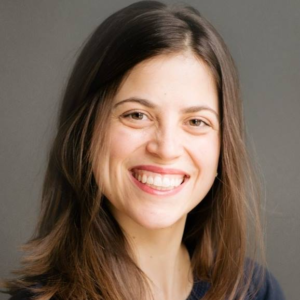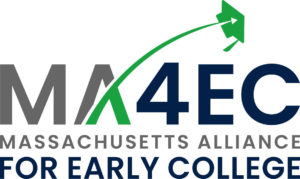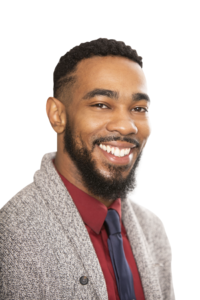We believe community leaders are a direct line to real, lasting social change. The Foundation prides itself on being receptive to new ideas, wherever they come from.
We are enthusiastic about amplifying the voices of leaders who have been underserved or overlooked by traditional models, and we believe that connecting with emerging voices early on in their work is the best way to build a vibrant, thriving network of innovative ideas, fresh faces, and bold efforts that can go on to incubate tomorrow’s most exciting and influential social projects.
Read on to learn more about three community leaders’ approaches to the leadership of their organizations and what they have learned along the way.

Trust is the cornerstone to change. Initiatives will only be successful when they are created with and by community members, and not pushed upon them.
Erika Giampietro, Massachusetts Alliance for Early College
Erika Giampietro has worked in the education space for many years. During her career, Giampietro held leadership positions in the Boston Public Schools and in two education-focused non-profits in Boston and nationally.
On January 1, 2022, Giampietro, along with two former colleagues at the Board of Higher Education, launched the Massachusetts Alliance for Early College (MA4EC).
Massachusetts Alliance for Early College is a cross-sector coalition focused on dramatically increasing the number of students with access to high-quality Early College programs in Massachusetts.
The Alliance’s mission is achieved through the following core pillars: coalition building, capacity building, advocacy, and innovation.
Represented in its namesake, MA4EC’s approach relies on convening an alliance of stakeholders invested in the initiative’s success. This alliance is comprised of over 100 members, including community-based organizations, college success-focused organizations, funders, businesses, and schools embedded in the education landscape.

We were building this ship as we sailed it; there had never been anything like this before in Massachusetts.
Erika Giampietro, Co-Founder & Executive Director
Giampietro emphasizes the importance of capacity building in advancing the Alliance’s mission. Expanding access across the state requires all stakeholders to share best practices, create communities of practice, and bring people together to work towards the shared goal of closing the education equity gap.
The Alliance’s work further extends to advocacy in the Massachusetts state government. The organization actively works with the legislature to advocate for funding and shape policy conditions to advance the movement toward making Early College available across the Commonwealth.
Innovation cannot happen in a vacuum. Giampietro says she and her partners derive inspiration for new ideas and models of education equity by looking outside of Massachusetts.
What else is out there that others are doing that we could adopt here in Massachusetts?
Erika Giampietro
One example of a unique approach to educational equity is adding a 5th year of high school, where students remain in the high school environment while taking a full schedule of college classes. This model, already gaining traction across the country, enables students to earn college credits towards an Associate’s Degree or Bachelor’s Degree, providing them a more seamless transition into the college environment and a quicker path to a degree.
As the leader of the Alliance, Giampietro’s approach centers around creating and sustaining trust, “Our work is only going to be effective if all the right constituents come together and work towards a shared goal.”
The future of early college initiatives in Massachusetts is bright. Giampietro acknowledges that three years ago, at the start of this journey, she and her team “were building this ship as we sailed it.” Now, eight months after the Alliance’s launch she and her team continue to build a coalition with the capacity for change using advocacy and innovation to find ways to close the education equity gap throughout the Commonwealth and beyond.

I learned that my biggest asset is not how well I can do the work, but how well I can get my team to believe in and implement the work.
Robert Hendricks, III, He Is Me Institute, Inc.
Robert Hendricks’ career began as a school-based educator teaching various subjects, later advancing to positions such as Director of Student Engagement, Dean of Students, and Assitant Principal.
He found that his experience as a Black male educator differed from others in his field, which shaped his philosophy around supporting student achievement.

These students were grossly underestimated in their academic brilliance.
Hendricks and other educators like him felt unsupported by their school administrations, encountering doubt about their leadership and ability to create meaningful change.
Parallel to these experiences, Hendricks observed black male students facing similar obstacles in their classrooms; they felt demoralized, overlooked, targeted, and deeply misunderstood by their teachers. These students were grossly underestimated in their academic brilliance.
He Is Me Institute works to get more Black men in the classroom to make educational environments more conducive to Black males’ academic and social-emotional success
He Is Me Institute’s program model has greatly evolved since its inception, shifting from a 5-week in-person summer teaching program for Black male college students to a virtual, social-emotional learning-based curriculum over 24 weeks during the school year.
This virtual setting not only opened the program to Black males across the country–currently operating in 11 different states–but also gave college student participants more time to discover a love for teaching and to practice their craft.
An additional key course component designed for the college students has been added to help them explore their identities, the education field, and best practices while teaching.
The organization has moved from delivering to developing programs and training schools to implement them. Its programming has also moved from a 1:1 partnership model to a collective one. This framework brings together school district administrators, colleges, and teacher residencies to coordinate and determine programmatic logistics.
As He Is Me Institute continues to expand and gain a national presence, Hendricks envisions himself spending more time advocating for the organization’s mission, programs, and participants.
Hendricks plans to continue being a leader and a role model for his team and for the field at large as his unique strategy for creating inclusive environments in the education space is brought to more students, teachers, classrooms, schools, and districts throughout the country.

Leadership is not only committing to doing this work but inspiring others to join in—I want to foster relationships and collaboration to create positive change for our communities.
Pilar Tucker, Psy.D. Candidate, Empower Our Crown Foundation, Inc.
While completing her Master’s degree in Clinical Psychology, Pilar Tucker was taking a full schedule of graduate-level classes while working full time and serving clients in a clinical setting.
In the midst of balancing these responsibilities, she was struggling with her own mental health.
Despite being fully immersed in the mental health field, she wasn’t sure where to turn for help processing her emotions, something she acknowledges is a frequent issue for others in her community. Tucker points to this experience as the inspiration for founding the Empower Our Crown Foundation, Inc.

Empower Our Crown Foundation aims to build and transform communities of color by providing empowerment workshops, leadership and educational training, mental health and wellness practices, and proactive engagement in the community.
At its inception in 2019, Empower Our Crown’s programming was fully event-based with Tucker hosting programs and brunches at community centers in Greater Boston. These workshops focused on mental health awareness, self-empowerment, and cultivating personal leadership.
Soon after, Tucker shifted the organization’s program delivery to developing and teaching curriculum-based programming. This method allowed participants to work progressively through the curriculum and build on what they were learning step-by-step.
Tucker also decided to focus the organization’s efforts on reaching younger, transition-aged youth. She saw the need for culturally competent interventions to ensure that this vulnerable population received opportunities to improve their overall wellbeing, understand the significance of their mental health, and grow their sense of community connectedness.
To reach this population, Tucker shares her curriculum with community centers and after-school programs, implementing a recruitment process that connects willing students and their families with Empower Our Crown’s offerings.
While Tucker’s nonprofit takes a bottom-up approach focused on at-risk youth, her consulting business operates from the top-down. Radical Transformation, Tucker’s consulting business, educates adults in corporate, medical, and university settings about leadership, empowerment, and emotional wellbeing.
As a doctoral candidate in Clinical Psychology, Tucker’s research is based on developing programming to teach methods of trauma-informed care to reduce high-risk behavior among marginalized populations. Radical Transformation’s top-down approach aims to train leaders to be culturally and emotionally competent to benefit all their clients’ wellbeing.
Importantly, Tucker does not do this work alone; her team at Empower Our Crown has grown from two at the beginning to nine at present. As the organization’s reach grows so do her partnerships with others aligned with her mission working in similar fields.
Tucker sees Empower Our Crown’s program offerings expanding to include not only teaching empowerment and leadership practices, but also financial, emotional, and social wellness in all spaces most conducive to reaching her target audience throughout Greater Boston and beyond.